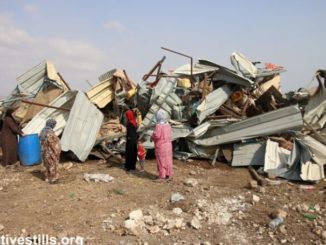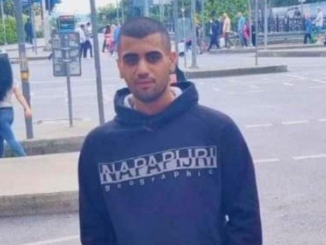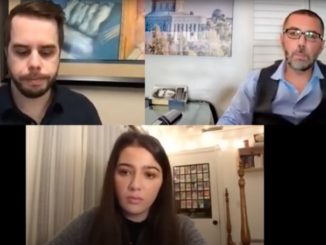
The grandson of late iconic South African leader Nelson Mandela has called on the Palestinians to follow the footsteps of South Africans while struggling against the “apartheid” state of Israel at the Pro-Palestine Conference held on April 27-29 in the Turkish city of Istanbul.
At the conference, organized by the Istanbul Sabahattin Zaim University’s Center for Islam and Global Affairs (CIGA), over 25 speakers from nearly 10 countries, discussed around the theme: ‘The Question of Palestine: Examining History, Geopolitics, and Future Prospects’. Speakers included Salman Abu Sitta, Rabab Abdulhadi, Ilan Pappe, Rawan Al-Damen, Na’eem Jeenah and Ramzy Baroud.
Chief ZMD Mandela, MP and Member of the Pan African Parliament (PAP) remembered how Palestinian and South African fates lie together and highlighted the importance of making Palestinian struggle visible and intensifying every protest campaign against the Apartheid State of Israel.
This is the full text of the speech delivered by Chief Mandela on April 27 , which he contributed to The Palestine Chronicle:
The Great Struggle for Freedom: Parallels between South Africa and Palestine
Honorable Program Director;
Respected Members of Academia;
Distinguished Conference Delegates;
Dearest Colleagues and Friends;
The 27th April marks a great milestone in South Africa’s long walk to freedom. On this day 25 years ago (27th April 1994) our global icon of human rights, justice and peace Nelson Rolihlahla Mandela joined millions of South Africans to cast their first ballot in a free and democratic South Africa. It was a momentous occasion as we cast off the shackles of 350 years of colonization and decades of brutal Apartheid rule. That victorious moment was a celebration of the sacrifices of many generations of women, men and children who collectively contributed to our glorious struggle for freedom; some paid for that freedom with their lives.
I want to pause for a moment to honor all of them and also to honor all in the global anti-apartheid movement in every city and village of the world. Your voices in our darkest hours kept the flame of hope and the dream of freedom burning brightly when our own leadership was incarcerated in Apartheid jails like Robben Island, Pollsmoor, Victor Verster and our liberation movements were banned and classed as terrorists.
Before I proceed, allow me also to pay tribute to the six million Palestinian refugees who have been denied the right of return to the land of their birth. There is no parallel for this in our South African struggle for freedom at least not on this scale. During the 1948 Palestine war, around 720,000 Palestinian Arabs out of the 900,000 who lived in the territories that became Israel fled or were expelled from their homes.
Distinguished delegates; it is fortuitous that in this week that we celebrate Freedom Day a group of young people from Khan Younis in Gaza came to participate in a football tournament in Cape Town. It reminded me of President Nelson Rolihlahla Mandela’s words when he visited Gaza in 1995 and said: “Our freedom is yet incomplete without the freedom of the Palestinian people.”
My topic today: The Great Struggle for Freedom, Parallels between South Africa and Palestine is, therefore, neither academic nor a matter that we take lightly but rather one that is rooted in our experience of struggle, pain and trauma. Madiba after designating the struggle for freedom in Palestine as intimately linked by an umbilical cord to our own freedom described the Palestinian struggle as “the greatest moral issue of our time”.
My approach to the topic, therefore, looks at the parameters of our two great struggles for freedom, briefly reflecting on the context of struggle and then proceeds to look some key parallels by exploring inter-alia the legal, geopolitical, ideological and historical elements.
Our own struggle for freedom in South Africa was rooted in our opposition to colonization and imperialism. Days after his release in February 1990 Nelson Mandela met Cde President Yasser Arafat in Lusaka, Zambia and said: “I believe that there are many similarities between our struggle and that of the PLO” stating “We live under a unique form of colonialism in South Africa, as well as in Israel, and a lot flows from that.”
It is easy to forget that much of our struggle for freedom and liberation was waged in the cold war era. The Apartheid regime in South Africa was supported by western governments especially the USA and UK; they not only played a pivotal role in equipping the brutal apartheid regime but the USA, in particular, provided the intelligence that led to the arrest of Nelson Mandela in 1962. Today, that iniquitous relationship is perpetuated in the USA’s unilateral support of the State of Israel and its condonation of the most horrific genocide and ethnic cleansing.
Addressing the Afro-Arab Solidarity Conference in Luanda, Angola on the 6th December 1981, ANC President OR Tambo reminded us that,
“Our destinies lie together. However difficult it may be, the Conference has the responsibility to ensure that in the future when the people of Palestine are under attack, those of South Africa do not stand idly by…”.
No political discussion about the parallels between our struggles can escape this harsh reality. In the case of Palestine the continued occupation and belligerent expansion of illegal settlements, the plight of six million refugees in the Palestinian diaspora, the thousands of political prisoners languishing in apartheid Israeli Jails including women and children, the imperialist attempt to annex the eternal capital Al Quds, and the daily humiliation and indignity meted out to Palestinians at border crossings and checkpoints.
On November 30, 1973, the United Nations General Assembly opened for signature and ratification the International Convention on the Suppression and Punishment of the Crime of Apartheid. It defined the crime of apartheid as “inhuman acts committed for the purpose of establishing and maintaining domination by one racial group of persons over any other racial group of persons and systematically oppressing them”.
The crime of Apartheid is defined by the 2002 Rome Statute of the International Criminal Court as inhumane acts of a character similar to other crimes against humanity “committed in the context of an institutionalized regime of systematic oppression and domination by one racial group over any other racial group or groups and committed with the intention of maintaining that regime”.
By this definition, Israel is an Apartheid State and the argument may well be made for a classification of an even harsher nature commensurate with the nature of the crime. One only has to view the shrinking map of Palestine to understand what I mean.
Only last week we read of more than 4000 new approvals of settler developments in East Jerusalem. How many such applications were approved for Palestinian applications? No prizes are offered for guessing that answer. Absolutely Zero! Israel is an Apartheid State.
I first visited occupied Palestine in November of 2017. My first impression was that what I saw and observed was worse than anything I had personally experienced under Apartheid South Africa. I was not alone in making such an observation. Before my visit, great leaders of the anti-Apartheid struggle the likes of Ahmed Kathrada, Desmond Tutu and former Minister of Defence as well as Minister of Intelligence Cde Ronnie Kasrils had expressed the same sentiment. Countless delegations of our trade union movement, NGO and religious bodies had likewise visited and came to the same conclusion. Israel is an apartheid state.
One of the participants who visited the West Bank as part of the trip, Mondli Makhanya, then editor-in-chief of the Sunday Times of South Africa, told veteran Israeli reporter, Gideon Levy,
“When you observe from afar you know that things are bad, but you do not know how bad. Nothing can prepare you for the evil we have seen here. In a certain sense, it is worse, worse, worse than everything we endured. The level of the apartheid, the racism and the brutality are worse than the worst period of apartheid”.
Another participant in the trip, Nozizwe Madlala-Routledge, a member of the South African parliament, who had been imprisoned during the apartheid era for her opposition to the South African apartheid regime said and I quote:
“It is hard for me to describe what I am feeling. What I see here is worse than what we experienced … The absolute control of people’s lives, the lack of freedom of movement, the army presence everywhere, the total separation and the extensive destruction we saw”.
In November 2011, the Reverend Allan Boesak, a veteran of the South African anti-apartheid struggle reiterated the assertion that Israeli apartheid is far worse than South African apartheid.
In an interview with Middle East Monitor, he said and I quote:
“It is worse, not in the sense that apartheid was not an absolutely terrifying system in South Africa, but in the ways in which the Israelis have taken the apartheid system and perfected it, so to speak; sharpened it”.
“For instance, we had the Bantustans and we had the Group Areas Act and we had the separate schools and all of that but I don’t think it ever even entered the mind of any apartheid planner to design a town in such a way that there is a physical wall that separates people and that wall denotes your freedom of movement, your freedom of economic gain, of employment, and at the same time is a tool of intimidation and dehumanization. We carried passes as the Palestinians have their ID documents but that did not mean that we could not go from one place in the city to another place in the city. The judicial system was absolutely skewed of course, all the judges in their judgments sought to protect white privilege and power and so forth, and we had a series of what they called “hanging judges” in those days, but they did not go far as to openly, blatantly have two separate justice systems as they do for Palestinians [who are tried in Israeli military courts] and Israelis [who are tried in civil, not military courts]. So in many ways the Israeli system is worse”.
The parallels persist but are not limited to this. It extends to incarceration of political leaders, detention of minors, torture and abuse of political prisoners; Lack of basic political freedoms, constraints of freedom of movement and the ever-present shadow of the state secret service Mossad prying into every aspect of the personal and political life of activists much like the South African apartheid state of old.
Like Apartheid South Africa of old left no stone unturned to destabilize the front line states, the apartheid Israel regime’s fingerprints are on virtually every effort to destabilize the Middle East region. We believe too that like apartheid South Africa, Apartheid Israel has its date with destiny that will finally end all parallels!
Prior to his arrest in 1962 Nelson Mandela undertook a trip to 16 African states including Egypt, Eritrea and Algeria to receive military training but more importantly to mobilize support.
During this trip, he flew twice to the UK to meet with cadres in exile and mobilize them. I want to urge Palestinians living in exile to follow this example of Madiba and be ambassadors for the Palestinian struggle wherever you find yourself.
One of the greatest pillars of our struggle was the fact that South African cadres in exile mobilized extensively sometimes under difficult circumstances.
Cde Dulcie September was assassinated on the streets of Paris others were maimed and injured in letter bombs. However, nothing could deter the Global Anti-Apartheid Movement from growing in strength and tightening the noose around the neck of the Apartheid regime and isolating it in the international community.
We must use every opportunity to make the Palestinian struggle visible and intensify our protest campaign against Apartheid Israel. The work of BDS must be applauded in this respect in setting us on the right trajectory.
My grandfather put three conditions for starting the negotiation process. Unban all political parties, release all prisoners and guarantee the right of return of all exiles. We must not make life comfortable for the Apartheid Israeli regime as long as it continues perpetuating apartheid in its worst form.
We must draw on the parallels of the South African experience where harbor workers in the UK refused to offload Apartheid South Africa’s produce. We must boycott every product coming out of apartheid Israel whether it is fresh produce or arms. We must rally the world for a complete arms embargo against Apartheid Israel.
My deliberation on parallels between our struggles would be incomplete without an appeal for unity. We owe a huge debt of gratitude to ordinary women and men all over the world and especially the activists in the Global Anti-Apartheid Movement whose unrelenting efforts contributed immensely to the isolation of the Apartheid regime in South Africa.
If indeed it was possible, my grandfather and our entire nation would thank them individually and collectively. So to all of you present here and those not present; whatever your contribution may have been, we profusely thank you and shall remain eternally indebted.
That UNITY was also evident across political formations in South Africa in the way the internal forces were mobilized in the Mass Democratic Movement and the emergence of the United Democratic Front that brought together all religions and faith formations, workers, businesses, students, academics and from every conceivable realm of society.
This is an important lesson which our brothers and sisters in the struggle for Palestine would do well to heed. The call to unity in the South African struggle is a parallel to be replicated and lesson to be learned. We must intensify our efforts in the unification process internally and externally.
Ladies and gentlemen, comrades and friends let the final parallel between our two just struggles be that like Apartheid South Africa, Apartheid Israel has its date with destiny. We must lobby the SADC region, Africa continent and our allies in the Non-Alignment Movement and the larger global community to support the boycott and isolation of Apartheid Israel until justice, peace and human rights prevail. Madiba reminded us that “peace, prosperity and security are possible only if they are enjoyed by all without discrimination.”
Finally, President Mandela reminded us that,
“It behoves all South Africans, themselves erstwhile beneficiaries of generous international support, to stand up and be counted among those contributing actively to the cause of freedom and justice”.
It was important, for South Africans “to add our own voice to the universal call for Palestinian self-determination and statehood” because “we know too well that our freedom is incomplete without the freedom of the Palestinians; without the resolution of conflicts in East Timor, Sudan and other parts of the world”.
I thank you!!!
– Grandson of the iconic South African leader, Nelson Mandela, Chief ZMD Mandela, is an MP in the South African and Pan African parliaments. He contributed this speech to The Palestine Chronicle.








